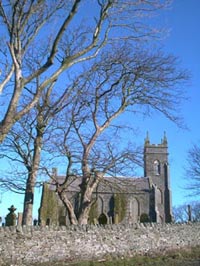Dr. John Alexander of Norwich: I.

Writing of A. B. Taylor of Manchester reminded me of the Scottish diaspora. After the Union of England and Scotland many Scottish craftsmen like Taylor came to England in search of a better life and a better pay-packet. Many settled in Lancashire, where a separate Scottish community grew up. Incidentally this Scottish diaspora paved the way for the later 19th century re-organization of the English Presbyterian Church around churches founded by these Scottish immigrants.
But our subject for this series was the son of one of these Scots living in England in body, but in spirit still very much living in Scotland.
William Alexander was a native of the village of Stoneykirk on the Mull of Galloway (Kirk pictured).
 He trained as a carpenter in Glasgow, but at the age of twenty, in 1783, he walked frpom there to Lancaster to join a brother who was already working there and who had advised him that there was more regular employment to be had there.
He trained as a carpenter in Glasgow, but at the age of twenty, in 1783, he walked frpom there to Lancaster to join a brother who was already working there and who had advised him that there was more regular employment to be had there.William Alexander had been brought up in the Kirk, and as he first set foot on English soil he stood still, removed his hat and prayed that God would keep him from evil company and give him grace to serve Him. Like A. B. Taylor, William Alexander had been warned about the evil manners of the people of England - apparently it was a common opinion in Scotland that the English were very wicked people!
The conscientious Scot quickly settled down in England, where he married. But his religion was also tried there, and made deeper. In a strange land he felt a deep and overwhelming loneliness, in which it seemed that no man cared for his soul. And in that loneliness a young clergyman was sent to him, a young man who had passed through the same conflict. William Alexander was brought into full assurance, and he could not but tell of the things God had done for his soul. He joined a Congregational church in Lancaster, where he became a leading member, not because he was wealthy in the things of this world, but because he was zealous for God.
In due course he became a preacher, working at his bench for six days of the week, and on the Lord's Day walking a circuit of over thirty miles, no matter how bad the weather was, preaching at three, four, sometimes five, places, eating dinner as he walked and tea 'when he had time'. Only the fact that he had a constitution of phenomenal strength saved him from an early grave.
Many were converted under his ministry, and the Congregational churches of Lancaster recognized an extraordinary call to the ministry. 'The Lancashire Apostle', as he had become known, was never wealthy, never the pastor of a great church as the world counts greatness. But he was the instrument of many conversions. He did not look for any earthly reward, but looked for a better reward, an eternal one.
His son John was born in 1892, and was practically brought up in a chapel. His earliest memories were of the church - one of them contering around an occasion when the little boy was looking around the chapel and his eyes lighted on the gleaming dove that formed the centre of the chandelier. Delighted, the child cried out, "Look, Momma, there's a Dicky Bird with a leaf in his mouth." What happened next can be imagined.
Although he was a hard worker, William Alexander did not neglect his children. A true son of the Kirk, he taught his children the Westminster Shorter Catechism, and he took a keen interest in their reading and education. And he was rewarded for this dilligence as well.
How he was rewarded in his son John shall be our subject in this series, of which more, God willing, next time.
Labels: John Alexander

0 Comments:
Post a Comment
<< Home